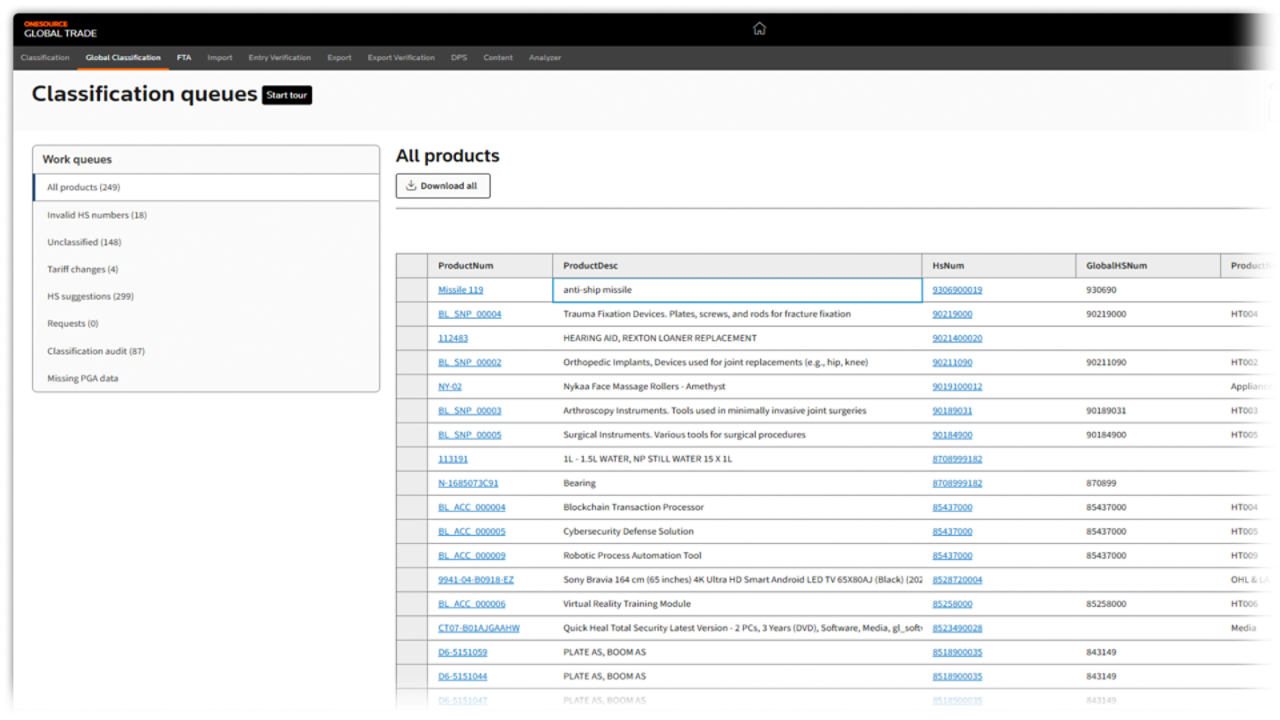ONESOURCE Global Classification
Ensure import and export compliance
Automate your Harmonized System (HS) and Export Control Number (ECN) classifications with accurate codes to stay compliant

Audit ready
Organise and document global trade classifications for easy access. Attach supporting documents to product records to streamline audits and ensure compliance.
Smart classification
Utilise AI to accurately classify goods. Our Smart HS tool suggests six-digit HS codes by analysing product traits, improving its precision with continued use.
Unified classification
Streamline trade compliance by centralising product data with ONESOURCE. Enhance consistency and accuracy in HS and ECN classification processes.
Regulatory updates
Keep track of HS and ECN changes to ensure accurate product classification. Adapt swiftly to new, retired, or altered regulations for compliance.
Smart and secure way of reducing risks and penalties
AI-driven HS classification for strategic focus
Automate HS classification with AI, enhancing insights and audit trails. Seamlessly integrate for accurate, multilingual data sharing without duplication.
Precision tariff data with expert analysis
Utilise our system's embedded content from 200+ analysts to ensure accurate tariff data across 220+ countries and territories, reducing error rates significantly.
Automated tariff change management
Utilise automated tools to track and manage changing tariff numbers. Update product classifications proactively for seamless compliance and visibility.
Centralised record-keeping for accuracy
Maintain all classification data centrally to track changes effectively, ensuring enhanced control and compliance with record-keeping requirements.
Comprehensive audit trail and compliance support
Stay audit-ready with ONESOURCE's complete transaction trail and documentation tools. Access global trade content for research and support, ensuring seamless customs compliance.
Seamless certified integration
Rely on certified integration with major ERPs such as SAP and Oracle for streamlined material management. Update your ERP systems with key classification data, enhancing workflow efficiency.
Talk to an expert
Automate classification for efficiency and accuracy in global trade compliance.
What do our customers think?

Quantifying the benefits of the Thomson Reuters solution is an annual task for me. The data generated from our TR solution, such as the number of products classified and others, provides tangible, quantifiable, and defendable data points.
Thomas Behr, Director of Global Trade Development, JM Huber
Featured resources
Streamline global trade with smart product classification
Overcoming classification obstacles
Top 7 benefits of a global classification platform
Frequently asked questions
Accurate product classification is fundamental to international trade because it directly impacts the determination of tariffs, duties, and compliance with various regulatory requirements. Each product must be classified correctly to ensure the correct duty is paid and to avoid penalties for non-compliance. Incorrect classification can lead to delays at customs, financial losses, and damage to a company's reputation. Moreover, accurate classification helps in seamless trade operations, as it ensures that goods move efficiently across borders without unnecessary hindrances, maintaining the flow of commerce and fostering good relationships with trade partners.
Organisations can prepare for regulatory changes in global trade by staying informed through reliable sources such as industry news, government publications, and trade associations. Leveraging technology solutions that provide real-time updates and alerts about regulatory changes can help businesses stay ahead. Implementing flexible systems that can quickly adapt to new regulations is crucial for seamless transitions. Regular training sessions and audits ensure that teams are knowledgeable and equipped to handle changes efficiently. By fostering a culture of continuous learning and adaptability, organisations can minimise disruptions and maintain compliance with evolving global trade regulations.
AI-powered classification tools like ONESOURCE's Smart HS significantly reduce the time and effort needed for product classification by automating the process. This leads to quicker and more accurate classifications, minimising the risk of noncompliance and incorrect duty payments. The tools are designed to adapt and learn from user input, improving accuracy over time. They also allow for proactive management of tariff changes and facilitate efficient data sharing across an organisation, ensuring consistent classification decisions.
Automation can significantly transform trade compliance by streamlining operations, reducing manual errors, and increasing efficiency. Automated systems handle routine tasks such as data entry, classification, and reporting, freeing up human resources for strategic activities. They provide real-time updates and analytics, enabling businesses to respond quickly to regulatory changes and make informed decisions. Automation also ensures consistency and accuracy, which are critical for maintaining compliance and avoiding costly penalties.
Experience it for yourself
Automate classification for efficiency and accuracy in global trade compliance.
Have questions? Contact a representative



